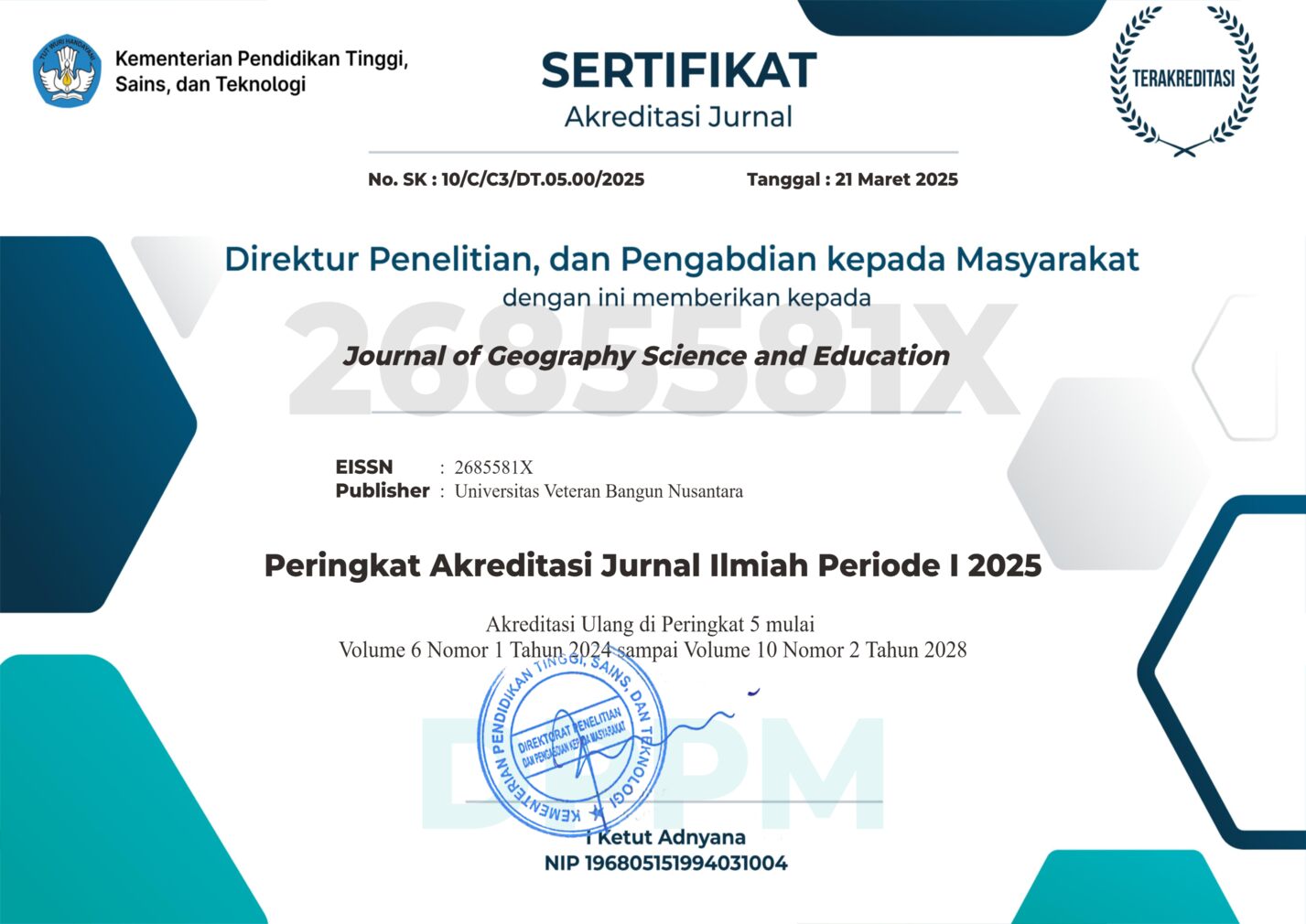APPLICATION OF SNOWBALL THROWING TO IMPROVE THE LEARNING OUTCOMES OF SOCIAL SCIENCE (IPS) GEOGRAPHY OF STUDENTS IN GRADE VIII C MUHAMMADIYAH 1 JUNIOR HIGH SCHOOL SUKOHARJO IN THE ACADEMIC YEAR 2017/2018
DOI:
https://doi.org/10.32585/jgse.v1i1.269Abstract
This study aims to improve the learning outcomes of IPS geography through Snowball Throwing cooperative learning methods for students in grade VIII C Muhammadiyah 1 junior hihg school Sukoharjo in the academic 2017/2018. This from of research is classroom action research conducted in two cycles each cycle consisting of two meetings, with four stages of research : Planning, Implementation, Observation and Reflection The subjects of this research were VIII C grade students of Sukoharjo Muhammadiyah 1 Junior High School in the academic year of 2017/2018. With a total pf 21 students. Data collection techniques used were observation, interviews, tests and documentation. The data analysis used in this research was qualitative deaccriptive analysis.The results of this study are to improve the learning outcomes of geography ips social science.This is shown in the learning outcomes of students before and after applying Snowball Throwing model cooperative learning, namely the learning outcomes of students who get KKM scores of 38,09 % increases to 52,38 % in cycle 1 and another increases in cycle 2 to 86,70 % from before. Based on the results of this study it can be concluded that with application of Snowball Throwing Cooperative learning model can improve learning outcomes of IPS geography for students in class VIII C Junior High School Muhammadiyah 1 Sukoharjo in the academic year 2017/2018.Downloads
References
Daldjoeni.N. 1997.Pengantar Geografi untuk Mahasiswa dan Guru. Alumni. Bandung
Dimiyati dan Mujiono. 1999. Belajar dan Pembelajaran. Jakarta : Rineka Cipta
Djamarah Syaiful Bahri. 1994. Prestasi Belajar dan Kompetensi Guru. Usaha
Hamdayana Jumantana. 2014. Model dan Metode Pembelajaran Kreatif dan Berkarakter. Ghalia Indonesia: Bogor
Huda Miftahul. 2013. Model-Model Pengajaran Dan Pembelajaran. Pustaka Pelajar : Yogyakarta
Isjoni. 2009. Pembelajaran Kooperatif . Yogyakarta : Pustaka Pelajar
Kamus Umum Bahasa Indonesia. 1995. Jakarta. Balai Pustaka
Ridwan Abdullah Sani dan Sudirman. 2017. Penelitian Tindakan Kelas Pengembagan Profesi Guru. Tanggerang : Tira Smart
Silberman. M.1996. Active Learning Strategis To Teach Any Subject, Ailly Bacon : Toronto
Sugiyono. 2010. Metode Penelitian Kuantitatif, Kualitatif dan R & D. Bandung. Alfabeta
Suprijono Agus. 2009. Cooperative Learning (Teori dan Aplikasi Paikem). Yogyakarta. Pustaka Pelajar
Tampublon Saur. 2004. Penelitian Tindakan Kelas Untuk Pengembangan Profesi Pendidik dan Keilmuan. Jakarta. Erlangga
Suwarto. 2008. Jenis-jenis dan karakteristik tes. Sukoharjo : Univet Bantara Press
Udin S. Winataputra. 2007. Teori Belajar dan Pembelajaran.Universitas Terbuka: Bandung
Wardiyatmoko. K. 2013. Geografi untuk kelas XII SMA/MA.Pusat Perbukuan Departemen Pendidikan Nasional.
Warsono dan Hariyanto. 2013. Pembelajaran Aktif. Bandung. Remaja Rosdakarya
Mudjianingsih, 2016. Meningkatkan Prestasi Belajar Siswa Kelas VIII.F SMP Negeri 33 Surabaya Pada Mata Pelajaran IPS Materi Pranata Sosial dengan Model Pembelajaran Snowball Throwing. Jurnal Pendidikan Vol.1:156 – 165.
Sri Lestari, 2015. Penerapan Model Pembelajaran Snowball Throwing untuk Meningkatkan Hasil Belajar Dalam Mata Pelajaran IPS Terpadu Siswa Kelas VIII Negeri Pogalan Kabupaten Trenggalek. Prosding Seminar Nasional Pendidikan Ekonomi & Bisnis Fakultas Keguruan dan Ilmu Pendidikan Universitas Sebelas Maret Surakarta Sabtu, 07 November 2015. http//media.neliti.com>172450-ID-none.
Diakses tanggal 14-2-2018
Perucha Nuraini W K W (2014). Penerapan Model Pembelajaran Kooperatif Tipe Snowball Throwing Untuk Meningkatkan Hasil Belajar Sosiologi Siswa Kelas IPS 1 SMA Negeri 6 Surakarta Tahun Ajaran 2013/2014.
Pdf. Jurnal.fkip.uns.ac.id>article>View File
Diakses tanggal 8-2-2018
Downloads
Published
How to Cite
Issue
Section
License
Authors who publish with the Journal of Geography Science and Education agree to the following terms:
- Authors retain copyright and grant the journal the right of first publication with the work simultaneously licensed under a Creative Commons Attribution License (CC BY-SA 4.0) that allows others to share the work with an acknowledgment of the work's authorship and initial publication in this journal.
- Authors are able to enter into separate, additional contractual arrangements for the non-exclusive distribution of the journal's published version of the work (e.g., post it to an institutional repository or publish it in a book), with an acknowledgment of its initial publication in this journal.
- Authors are permitted and encouraged to post their work online (e.g., in institutional repositories or on their website) prior to and during the submission process, as it can lead to productive exchanges, as well as earlier and greater citation of published work.










